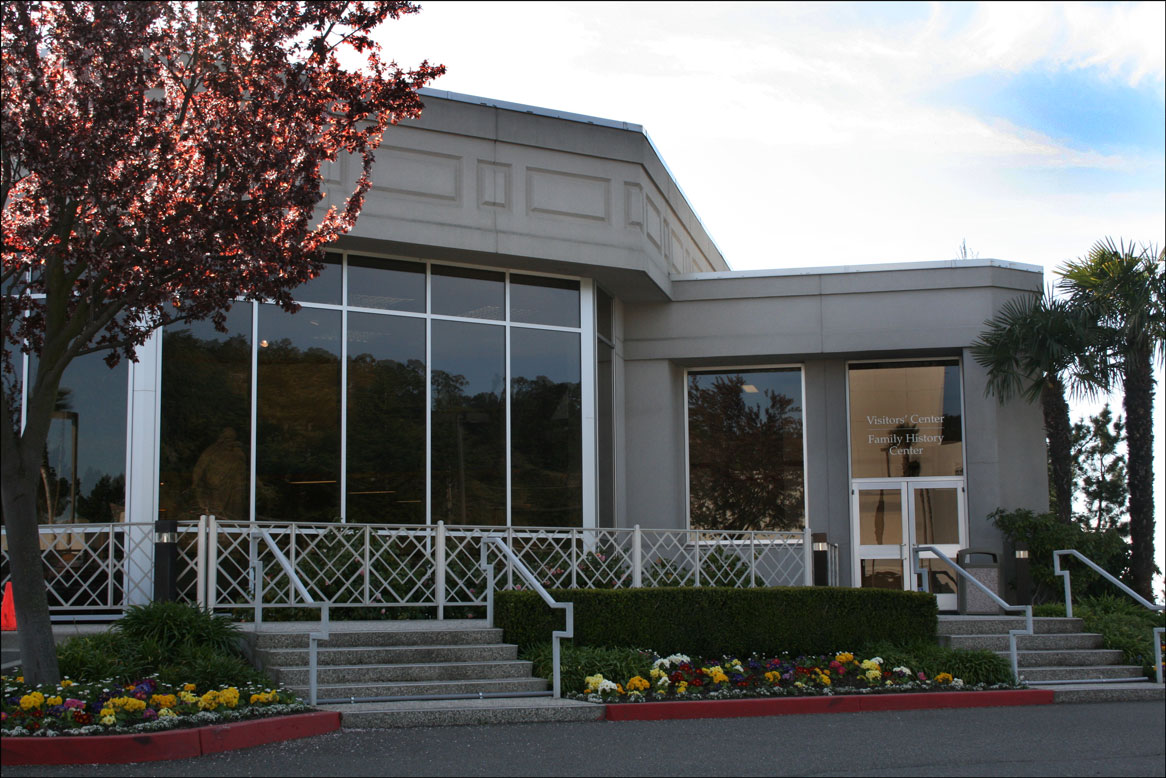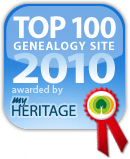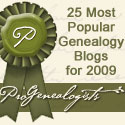Saturday’s meeting of the membership of the California Genealogical Society was held at the Oakland Family History Center (FHC). The meeting was extremely well attended.
Oakland Regional Family History Center
Source: Oakland Regional Family History Center (Oakland, Alameda Co., California). Photographed by Stephen J. Danko on 08 Mar 2008.
The venue for the meeting was apt, because the featured presentation was “Amazing New Offerings at the Family History Library” by Margery Bell, Assistant Director of the Oakland Regional Family History Center.
The FHC Portal
Margery explained that, since the Oakland FHC is a regional center, patrons of the facility have free access to a number of databases not available at other FHCs. The FHC Portal provides access to Ancestry.com, Footnote.com, Genline, the Godfrey Memorial Library, Heritage Quest Online, and World Vital Records.
In particular, Margery noted the offerings of Footnote.com and explained that the FHC has a special relationship with Footnote.com since Footnote.com is using technology developed by the Family History Library to scan microfilms. She demonstrated how to use the website and showed how to find Revolutionary War service records and pension records on the site. Patrons can search Footnote.com at home and, once they find images of interest to them, they can access the images for free at any regional FHC.
Margery also highlighted Genline, a database of images of Swedish records available for free at regional FHCs through the FHC Portal.
FamilySearch Labs
Of particular interest to participants was the indexed records search facility at FamilySearch Labs. Registration is required to access the collection. Margery explained that the indexes are 98% accurate. The records are indexed by two indexers familiar with the language. Disagreements are resolved by arbiters.
After searching for records, researchers can browse the records by scrolling from one record to the next record in the collection. Researchers can also choose to browse through just the hits in their search by clicking on a single button.
In addition to indexed collections, researchers can browse the images in collections that have been digitized but not yet indexed, similar to the way researchers would browse through the images on microfilms. Eventually, all 2.8 million rolls of microfilm will be digitized and available either at home through FamilySearch Labs or at an FHC.
Since the rights to some microfilms are owned by organizations other than the Family History Library, not all images will be available for home access. Researchers will be able to search the indexes to these films at home, but must view them either at an FHC or through the contractor’s own website.
Two years ago, the Family History Library announced that the project of scanning all films would be completed within ten years.
FamilySearch Wiki
Another development of interest is the FamilySearch Wiki where users can contribute genealogical content. In particular, the FamilySearch Wiki will provide research guidance for genealogists researching in countries the world over.
New FamilySearchÂ
A third development of FamilySearch is the New FamilySearch. Currently, this facility is only available to members of the Church of Jesus Christ of Latter Day Saints whose temples are also using it. In a year, all temples will be using the New FamilySearch, and the site may be expanded in the future to allow anyone to participate if resources allow.
The basis of the New FamilySearch is an interactive Web 2.0 application wherein all Ancestral File, IGI, Pedigree Resource Files, and Church membership records will be integrated into family trees that will merge duplicated records in those resources and enable researchers to examine conflicting records for the same individual and select preferred records to show up in their view of the New FamilySearch. Corrections can be added, but incorrect information already in the system can only be changed by the person who initially contributed it. If the original contributor is deceased, a closely related researcher can claim the records.
The New FamilySearch will also allow users to sign in to help other researchers long-distance in real time, online.
In the future, we may be able to add timelines of the lives of individuals in the database and add scans of the original documents.
California Genealogical Society Update
Jane Lindsey of the California Genealogical Society and Library provided information about the databases available online at the CGS Library, including WorldVitalRecords.com, Footnote.com, NewEnglandAncestors.com, and Ancestry Library Edition . She also updated members about upcoming society events, including the upcoming Member Coffee on April 2 in San Francisco, the Central and Eastern European Genealogy Workshop on April 12, and the society’s Research Trip to Salt Lake City from April 13-20. Kathryn Doyle provided a tour of the society blog.
Copyright © 2008 by Stephen J. Danko





Thanks! I was away and had to miss the CGS meeting on Saturday. You info fills in some of what I missed. I appreciate it.